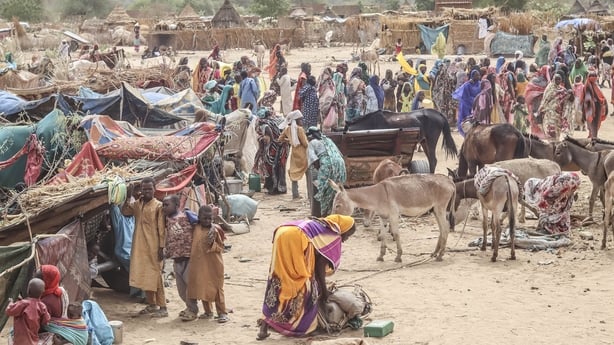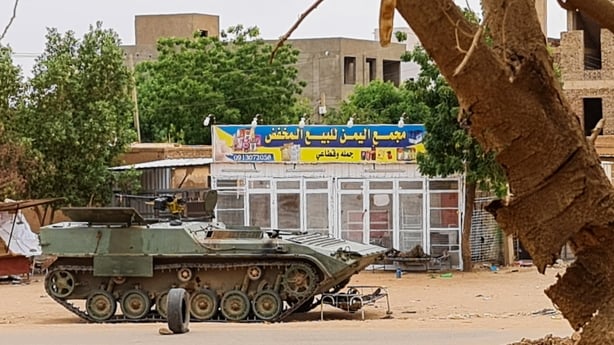More than 800,000 people may flee Sudan as a result of fighting between military factions, including many who had already come there as refugees, a UN official has said.
"Without a quick resolution of this crisis we will continue to see more people forced to flee in search of safety and basic assistance," Raouf Mazou told a member state briefing in Geneva.
"In consultation with all concerned governments and partners we've arrived at a planning figure of 815,000 people that may flee into the seven neighbouring countries."
The estimate includes around 580,000 Sudanese, he said, with the other existing refugees from South Sudan and elsewhere.
So far, he said some 73,000 people have already fled to Sudan's seven neighbours: South Sudan, Chad, Egypt, Eritrea, Ethiopia, Central African Republic and Libya.

At the same briefing, the United Nations humanitarian coordinator in Sudan warned that the humanitarian crisis was turning into a "full blown catastrophe" and that the risk of spillover into neighbouring countries was worrying.
"It has been more than two weeks of devastating fighting in Sudan, a conflict that is turning [the] Sudan humanitarian crisis into a full blown catastrophe," Abdou Dieng, resident and humanitarian coordinator in the country, said via video link.
Foreign governments have been scrambling to evacuate their nationals amid warnings the country could fragment.
The Tánaiste Micheál Martin said today that 218 Irish citizens and their dependents have now been evacuated from Sudan.
In a post on Twitter, Mr Martin said: "Ireland continues to offer strong support for evacuation efforts through our consular teams in Dublin, and across the region in Nairobi, Cairo, Amman, Riyadh and Addis Ababa."
Consistent heavy gunfire highlights daily terror of life in Khartoum
Meanwhile, fighting could be heard in Khartoum early this morning despite a supposed ceasefire extension and the United Nations warned of a humanitarian "breaking point" as clashes between rival military forces entered a third week.
Hundreds of people have been killed and thousands wounded since long-simmering tension between the Sudanese army and the paramilitary Rapid Support Forces (RSF) erupted into conflict on 15 April.
Both sides agreed yesterday to extend a much-violated humanitarian ceasefire that had been due to expire at midnight for a further 72 hours, in a move the RSF said was "in response to international, regional and local calls".
The army said it hoped what it called the "rebels" would abide by the deal but it believed they had intended to keep up attacks. This morning, the sound of artillery, airstrikes and anti-aircraft fire was audible in the capital Khartoum.
Many fear for their lives as Sudan's two most powerful men prosecute war in a country that has faced civil wars, coups and economic hardship for decades.
"I have to keep working, especially in these circumstances. Everything is more expensive," said Abdelbagi, a barber in the capital Khartoum. "I show up to work for two or three hours then I close up because it's not safe."
We need your consent to load this rte-player contentWe use rte-player to manage extra content that can set cookies on your device and collect data about your activity. Please review their details and accept them to load the content.Manage Preferences
Violence has paralysed the city and risks reawakening war in the vast Western region of Darfur scarred by a two-decade old conflict, despite numerous ceasefire pledges.
Together, the army and RSF toppled a civilian government in an October 2021 coup but their power struggle has derailed an internationally-backed transition to democracy and is threatening to destabilise a volatile region.
At least 528 people have been killed and 4,599 wounded, the health ministry said. The United Nations has reported a similar number of dead but believes the real toll is much higher.
The fighting has pitched Sudan towards a civil war and sent tens of thousands of people fleeing into neighbouring countries.
It has deepened the humanitarian crisis in Sudan, where a third of the people already depended on some form of assistance, said Martin Griffiths, Under-Secretary-General for Humanitarian Affairs and Emergency Relief Coordinator at the United Nations.

"The scale and speed of what is unfolding in Sudan is unprecedented. We are extremely concerned by the immediate as well as long-term impact on all people in Sudan and the broader region," he said.
Victoria, one of the tea sellers that used to dot Khartoum's streets before the fighting began, said her children are struggling to understand what is happening.
"So I risk my life to try to work and if God helps me I'll get them some food and if he doesn't I'll keep trying. But just sitting useless doesn't help and being scared doesn't help," she said.
The United Nations' World Food Programme has said it will immediately lift the suspension of its operations in Sudan that was put in place after the deaths of its team members.
"WFP is rapidly resuming our programs to provide the life-saving assistance that many so desperately need right now," WFP executive director Cindy McCain wrote on Twitter.
The WFP said on 16 April it had temporarily halted all operations in Sudan after three of its employees were killed in clashes between the Sudanese army and the paramilitary Rapid Support Forces (RSF) a day earlier.
Burhan and Hemedti are digging in for what could be a protracted battle.
Army leader General Abdel Fattah al-Burhan has said he would never sit down with RSF chief General Mohamed Hamdan Dagalo, also known as Hemedti, who in turn said he would talk only after the army ceased hostilities.
In Khartoum, the army has been battling RSF forces entrenched in residential areas. Fighting has so far seen the more agile RSF forces fan out across the city as the better equipped army tries to target them largely by using air strikes from drones and fighter jets.

